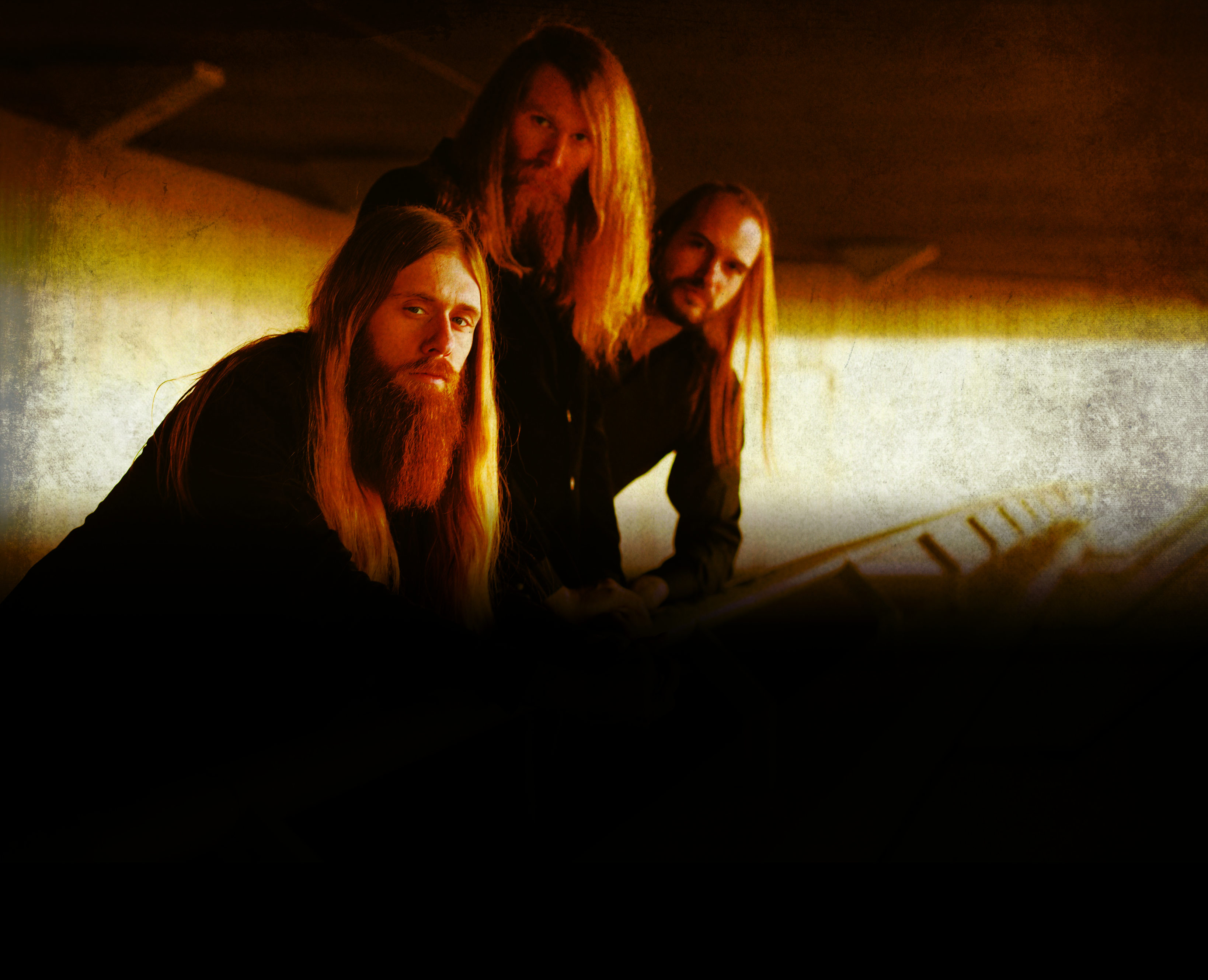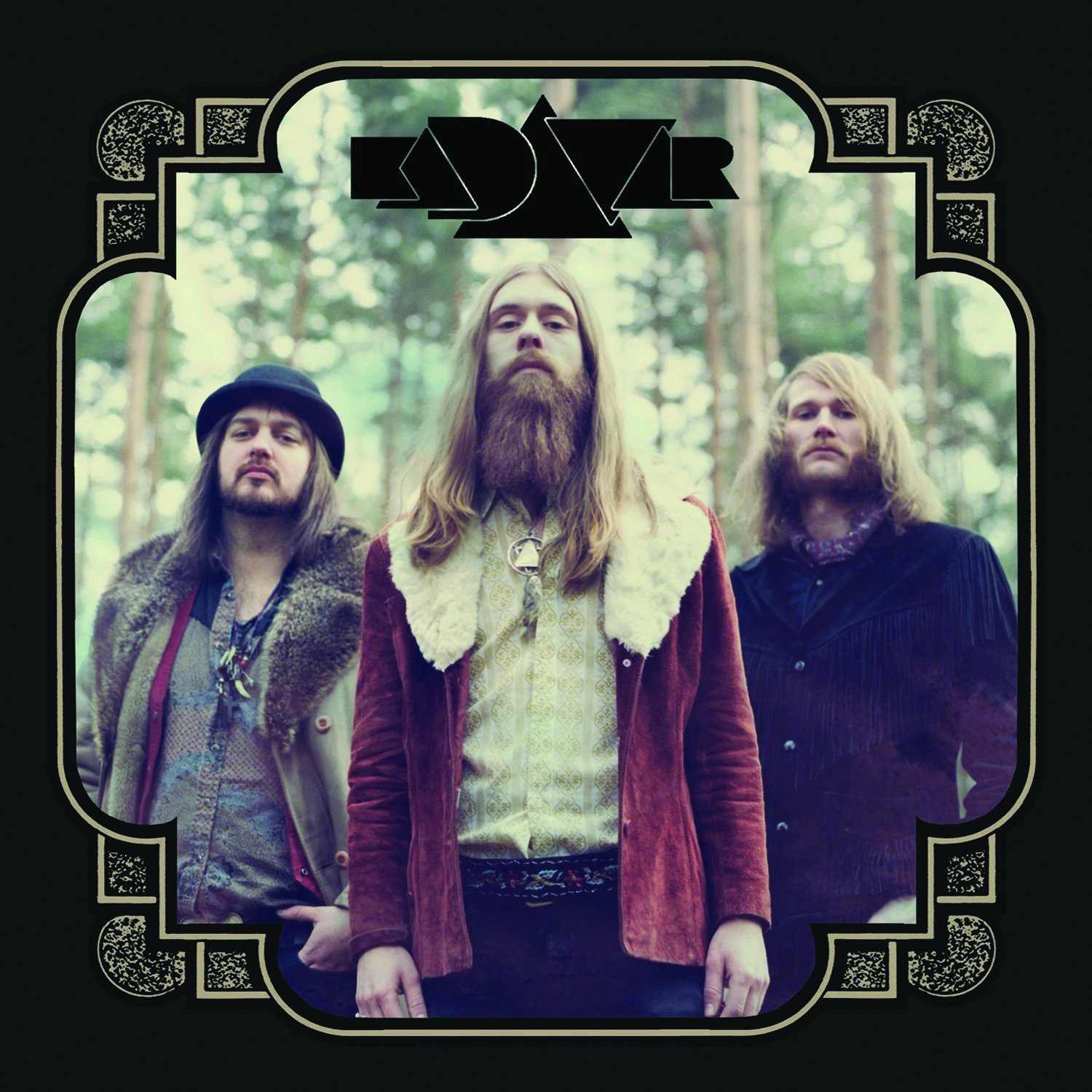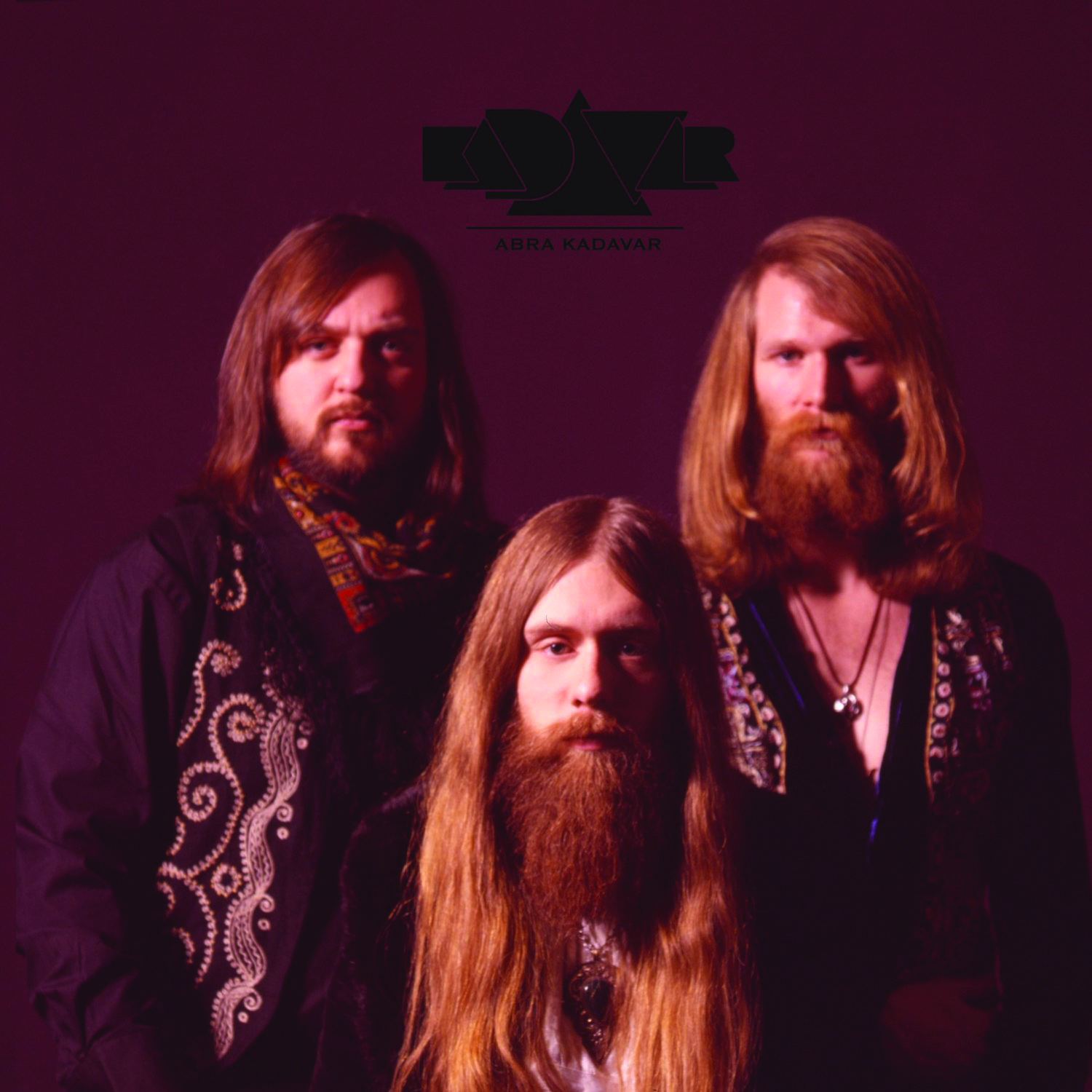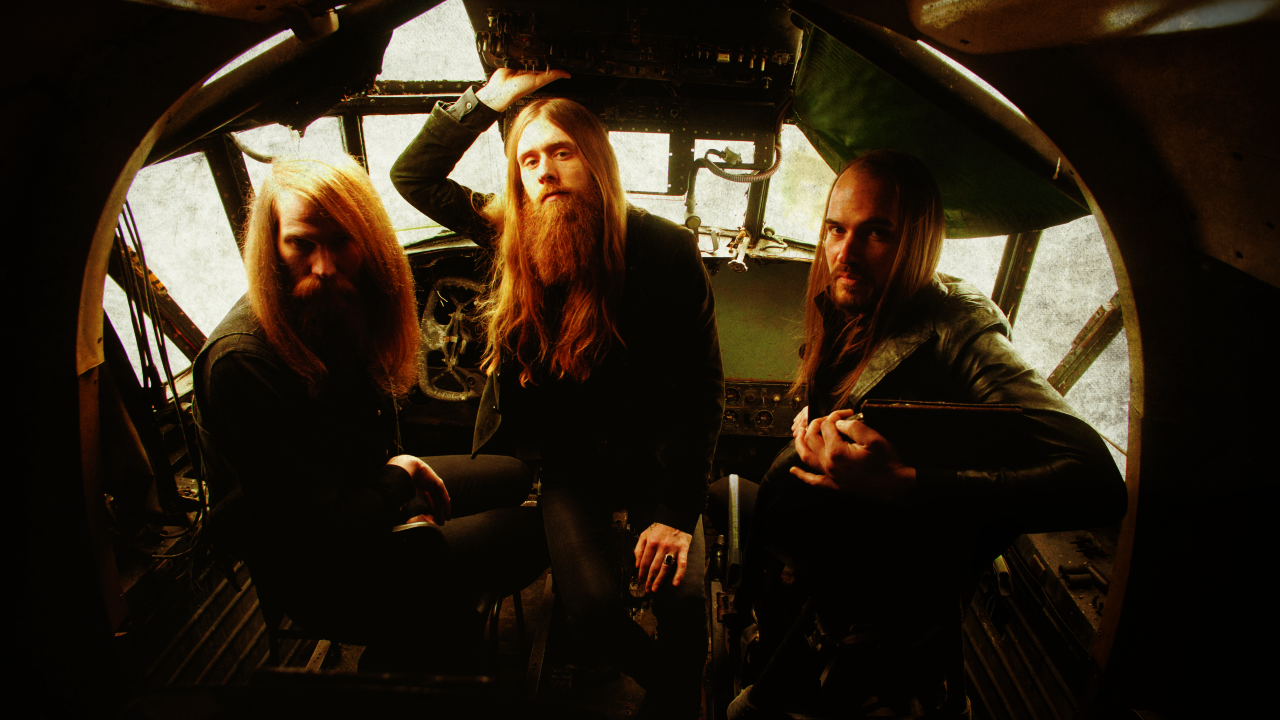Even if the prolific retro/occult/proto-hard rock trend has become something of a potluck dinner as of late, few acts have rocketed to the top of the pack like Berlin’s Kadavar.
Seemingly out of nowhere and on the strength of a self-titled debut initially released through a small local label, they were instantly the band to check out. And if Kadavar and the ensuing Abra Kadavar were eye-openers for young metalheads discovering their favourite style’s roots, their newest offering, Berlin, has the chops – in a fair world, songs like Last Living Dinosaur would have huge hit single potential – to allow them to step over that final gap still separating them from more mainstream audiences. And yet, still, naysayers will likely dismiss them as simple bandwagon followers or hipsters more concerned with their beards and clothes than their actual instruments.
When asked if Kadavar are trying to turn the clock back to 1972, guitar-toting frontman Christoph ‘Lupus’ Lindemann agrees that this may be the case with their debut, but not anymore. If anything, he describes Kadavar these days as “a party band you can hopefully dance to”, far from the retro-obsessed bunch of hairy dudes some would like to caricature them as – even if Lupus himself has yet to listen to his own music on CD, as he only owns a turntable. Furthermore, the title of the new album – named, as you may suspect, after their hometown – gives an insight into the individuality which is at the core of their art, and even their own identity.
“When someone asks me where I’m from,” he muses, “I never answer ‘Germany’, but ‘Berlin’, because Berlin is, well, Berlin. And it’s surrounded by, basically, nothing, so we feel stranded, but in a good way. I grew up in East Germany and was four when the wall came down, and I spent the first 18 years of my life in a small village. But as soon as I was done with school, I knew I needed to go out and see the world. I didn’t have the balls to go to, say, London or New York, whereas Berlin is not too far away from my hometown and people there still speak German…” He pauses, before adding with a laugh, “I thought it wasn’t going to be too much of a change!”
Lupus was already playing music by that time, and his new life soon revolved around it, yet at the service of other bands, not his: “For four years, I worked at a big venue called White Trash Fast Food, booking acts. I got totally immersed in the nightlife, and since there’s always a party going on somewhere in Berlin… let’s say I really took advantage of it! But now, I enjoy it for different reasons. First of all, there’s a lot of space, for everyone. Secondly, it’s a very permissive place, unlike anywhere else in Germany. More importantly, it’s still damn cheap, especially compared to London or New York. We’re an underground band, but because we’re touring enough and because we pay cheap rents, we have the luxury to live off our music for the time being. That wouldn’t be possible anywhere else.
“Even in our early stages,” he continues, “all we had to do was to work, say, two days a week and that would get us enough money to focus on music the rest of the time. I know some musicians in London who have to work two jobs, 10 shifts a week, and then pay a ludicrous amount of money for a tiny rehearsal place, or even just to play shows! It’s the opposite here. Berlin allowed us to just be creative.”

Lupus also brushes away the suspicion that their impressive lengthy facial hair and love of retro fashion is a hipster-baiting PR stunt – a theory fuelled by the band’s first two albums boasting the kind of covers that wouldn’t look out of place mounted on the walls of a Shoreditch kitten café. Both depicting the trio in shots that look like they were taken in 1972, it’s understandable why the images provoked some cynicism…
“We looked like that before we formed the band!” Lupus insists. “That’s actually what got us together the first place, as we bumped into each other in a bar, and since we had the same look and same type of clothes, we figured we were bound to have the same musical tastes, which was thankfully the case. We never thought of capitalising on it. We have many photographers among our friends and, because of the way we are, as soon as we started doing music together, there would always be some guy wanting to do a photo session with us. So even before we had recorded a single note, we already had tons of potential promo pictures!
“Initially, we had an idea for the cover of our first album that never came to fruition, and with our then-label manager breathing down our neck asking when we would finally give him the artwork, at the 11th hour we settled on a cool photo taken a week before, and that was it. We never had the same intention to use that same trick again, but when we got signed to Nuclear Blast in early 2013, after Theo [Mindell] from Orchid recommended us, we were already due to play Roadburn that year and everybody agreed that it would be fantastic to have the album out by then. Yet that also meant that if we wanted to respect that deadline, we had to write it, record it and mix it in four weeks! So we had pushed ourselves in a corner and had to once again, at the last minute, just use another picture of us three. We had no other option!”


But what of the music? If Kadavar’s new album is titled Berlin in reference to their homeland, it’s not out of sheer patriotism – nor, as Lupus reveals, for the bands that have come to define the German rock scene.
“Forty years later on, I’m still amazed by krautrock’s diversity and vision,” says the frontman, “but somehow, that never came into the picture with Kadavar. I actually tried to incorporate those mechanical grooves, but it just didn’t work out. The music I listened to most while writing this album was proto-punk, like The Damned or The Stooges. And if I had to pick just one contemporary act that urged us to get started, it would be Danava.”
In fact, the only trace of anything truly Germanic you’ll find on the album is its bonus track, a cover of Velvet Underground collaborator Nico’s most obscure song, the haunting Reich der Träume (‘Realm Of Dreams’).
“It took me weeks to figure that out without sounding stupid and having an accent,” laughs Lupus. “Words in German are very strong and every single one has to have a specific meaning, whereas in English, just as long as it sounds good, you’re cool. Believe me, I did try to write in German but it just didn’t work, at all.”
So if it’s not for the scene, for blind patriotism or for shaping their sound, just why the hell did they decide to name their new album after Germany’s most famous city?
“Everything!” Lupus barks back. “Its history, the scars left by WWII, the wall, its ugliness, its beauty, the special vibe it carries… It’s all this combined that makes Berlin unique, and we tried to replicate that feeling with this record. We live near a former airport called Tempelhof, built in 1923 and later turned into one of the world’s then-largest buildings by the Nazis. When Berlin was divided in two, this was a bit of an unofficial neutral zone where people from East Berlin could buy stuff from the West. It was closed for good in 2008 and became a city park, yet with all its buildings intact, it’s a symbol of what the city went through over the last hundred years. We recorded the album in the building’s in-house analogue studio.”
Without Berlin and the myriad possibilities it offered them, Lupus confirms there probably wouldn’t be any Kadavar these days. Yet even to him, their current success came about along “an insane series of happy accidents, so to speak. Without them, we wouldn’t be talking right now and thanks to them, I get to see the world and make a living from I love most: music. So we clearly intend to make the most of it as long as we can.”
BERLIN IS RELEASED ON AUGUST 21 VIA NUCLEAR BLAST
BERLIN RETRO ATTACK!
Three teutonic titans-in-waiting you need to check out…
Heat
Signed on Kadavar’s former label This Charming Man, these five retro-rockers follow Norway’s Brutus and Sweden’s Graveyard’s quest for recapturing that one, elusive pure-70s hard-rock vibe with that mandatory twin guitar attack. Think somewhere in between a bluesier version of Deep Purple and early Uriah Heep. Their new album, Labyrinth, is just out.
www.facebook.com/heatthelights
Lucifer
Born out of the still-fresh ashes of the acclaimed yet short-lived The Oath, Johanna Sadonis’s new musical adventure smartly picks things up where its predecessor left off. But the best thing about their debut, Lucifer I, recorded last spring in Berlin, is that it was composed and performed on guitar by former Cathedral Gaz Jennings with his instantly recognisable monstrous riffs.
www.facebook.com/luciferofficial
Samsara Blues Experiment
Having just played Hellfest and formed back in 2007, these bell-bottomed hippies love Hendrix, Led Zeppelin and blues-rock, but also have a penchant for traditional Indian music and, like, jamming their brains out. For proof, check their third full-length Waiting For The Flood, released last year, with none of its four tracks under the 10-minute mark.
